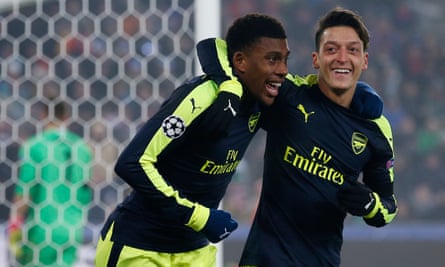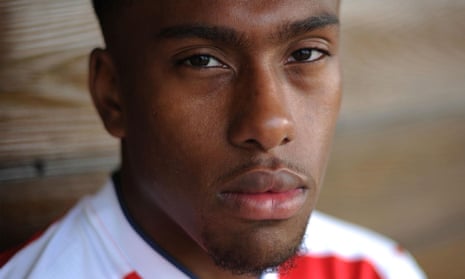Adjusting to life in the Premier League fast lane has been an eye-opener for Alex Iwobi. He still has to suppress the urge to beam when the television cameras pan down the lineup of players in the tunnel before a game. Look serious, Alex, he reminds himself, even if he is exhilarated inside.
Away from the pitch, dealing with attention is a new experience in itself. Whether it is a stranger bowling up to him in a shop while he is buying trainers for a friend to impersonate his goal celebration, or a fan following his car for miles while he was driving away from the Emirates with his mum, Iwobi is doing his utmost to take it all in his steady stride.
“I thought, this fan is going to follow me to my destination. I need to take a detour,” he says. “It was crazy. I was almost scared. ‘Iwobi! Iwobi!’ For 20 minutes. It was a bit too much.” One nifty move later the bizarre car chase was over and the Arsenal youngster was able to see the lighter side of one of the many unexpected scenarios he has absorbed since his career trajectory suddenly rocketed.
At the tail end of the Champions League group stage a year ago Iwobi shone as Arsenal beat Bayern Munich in the youth version of Europe’s elite competition. The game took place at Meadow Park in leafy Borehamwood in front of a few hundred enthusiasts. He scored twice (one an absolute peach). A week later he made his first-team debut. The milestones any young player aspires to pass were ticked off in rapid succession. League Cup appearance. Check. FA Cup. Check. Premier League. Check. First start. Check. First goal. Check. First Champions League start – that just happened to be in the Camp Nou to embellish that sense of whirlwind. Gargantuan check.
Attempting to reflect on the progress he has made, which culminated in his pride in tucking away his first goal in the Champions League proper on Tuesday in Basel, Iwobi, 20, looks taken aback. He has barely had the time, or even the inclination, to over-analyse the bigger picture. Focusing on bite-sized challenges, game by game, keeps him grounded.
Ferris Bueller’s mantra suddenly springs to mind: “Life moves pretty fast. If you don’t stop and look around once in a while, you could miss it.” Iwobi takes a moment metaphorically to stop and look around. “When I sit down and actually think about what I have done, to score in the under-19s a year ago and then to score my first Champions League goal for the senior team is mad,” he muses.
The glow had barely subsided from the goal in Basel when Iwobi was playfully tugged back down to earth by Mesut Özil. It was Arsenal’s master provider who had set him up with an agile reverse pass. “I have to call him ‘my boss’ because he assisted me,” Iwobi explains, chuckling. “Alexis likes to take the mick out of me when I don’t score in training. They are funny.”
For a rookie attacker there are worse places to be learning than in the sphere shaped by Özil and Sánchez. “They will tell you what you need to work on but in a jokey kind of way. They do advise me, saying I just need to compose myself, relax and the chances will come. They try to help in the best way they can.”
It means the world to a boy who was developed at Arsenal, the club he began to train with from the age of six. He was not necessarily the one from his age group who was expected to last the distance and make his way to the first-team dressing room. Iwobi came close to being released when he was in his early teens.

“Because I wasn’t as big, fast or strong as everyone else, there were question marks on me and my ability that I wasn’t imposing myself on the game as I should,” Iwobi recalls. “It was upsetting because I was going to school thinking, ‘What can I do to improve?’ I would have extra sessions with my dad or friends. My mum made me do kick-ups in the living room. My sister even tried to play football. Everyone was trying to help me.”
Naturally they are all proud of how Iwobi turned things around. He is still very close to his sister, Marie. The other day he went to visit her at university, pulling a hood up so as not to draw any special attention. “I just want to enjoy the time with my sister,” he says. “We are close, we are always together, having a laugh. I’m always trying to take care of her.”
As a youth-team player Arsenal wanted Iwobi to be braver, learn not to shy away from physical challenges, use that platform to express himself. He has certainly responded and now he is aiming to hone his game further. He wants to build in more end product. “That’s what the big players get recognised for, scoring goals or creating goals,” he says. “I feel like I did, then I had a little drought, but I think that this goal against Basel will give me a confidence boost.” Iwobi seems to have his priorities in impressive shape.
He is conscious of the opportunities he has been given to make the best of his talent, and that point was reinforced when he spent a day recently visiting Arsenal in the Community’s headquarters. He was guided around by a guy his age who struck a chord with him. Lloyd, who grew up on an estate not far from the Emirates Stadium, was drifting on to the wrong side of the tracks but was offered a helping hand by Arsenal, who delivered football sessions on the pitch their foundation had built on the estate. The coaches look out for young people on the fringes and Lloyd was invited to take part in some initiatives.
“He almost reminded me of myself,” Iwobi says. “I used to play football on the streets with my friends and ended up where I am today. He used to do that and Arsenal is helping him to get to where he wants to be in the future. He told me he wants to be a physiotherapist and they are helping with that.”
Iwobi and all his team-mates are donating a day’s wages as part of the club’s fund-raising campaign. His contribution has risen notably since he signed a new contract. He understands why people are sceptical about whether young players are given too much too young nowadays. “With the money thing it is mad,” he says. “As a young kid earning so much, having a house and driving a nice car it is nice but it is something I keep level-headed about.”
One person who is particularly influential on that front is his uncle, Jay-Jay Okocha. “We speak every couple of weeks. He does advise me, not just on the pitch but off it too. Football is a short career so he is telling me to maintain the lifestyle you have to get businesses and properties. He is trying to keep me level-headed and to help me plan for the future after football.”
Following in Okocha’s footsteps, Iwobi has chosen to play for Nigeria instead of England. He left Lagos when he was four years old and after a brief stay in Turkey, where his uncle was playing, was raised in east London.
Having spent most of his life in England, he has been astounded by the reaction when he travels to Nigeria to represent the Super Eagles.
“Everyone appreciates you. You’re almost like a king!” he says. “When I arrived at the airport I thought, I’ll just have my earphones in, but everyone was like ‘Iwobi! Iwobi!’ Oh gosh. Hi guys! I didn’t know what to expect. It was just mad. I always go with Kelechi Iheanacho. When we go we get escorted. Because I’m not used to the Nigerian culture as much as they are, they do help me with it. I can’t really speak the language that well. They help me with the fans. The fans are very different there. They don’t ask me for autographs, they ask for boots, money.
“At my debut we played in a stadium that holds 30,000 and there was 60,000 – I don’t understand how. People were standing on the floodlights, on the scoreboard. I was thinking, ‘What? This isn’t even safe!’ But people there will do anything to watch the match. Sometimes in a Premier League game the fans are a bit quiet but in Nigeria you just hear trumpets, everything. The atmosphere is so different compared to England.”
The international scene has been yet another eye-opener in this young career. Iwobi cannot wait to experience more. He is hopeful he can one day win a medal with Arsenal. He remembers going to Wembley to see the FA Cup victories in 2014 and 2015, and being hugged by an over-exuberant fan. “I was like, ‘Don’t kill me!’ but it was amazing. It gave me the motivation to try to get on the pitch and hold those trophies.” As for the title, he goes on to YouTube sometimes to watch footage from Arsenal’s last winners in 2004. “Some of the players Arsenal used to have were scary. But even now the quality we have now, this season could be our season. It is wide open.
“I walk past the corridors and see all the pictures of players holding a trophy and celebrating but my face is not there. I want to be there. Hopefully one day my face will be on the wall celebrating too. That would be amazing.”
Arsenal’s match against Stoke City is dedicated to The Arsenal Foundation. Arsène Wenger and the first-team squad will donate a day’s wages to support projects that make a positive and lasting impact in the lives of beneficiaries. For more information and to donate visit www.arsenal.com/thearsenalfoundation

Comments (…)
Sign in or create your Guardian account to join the discussion